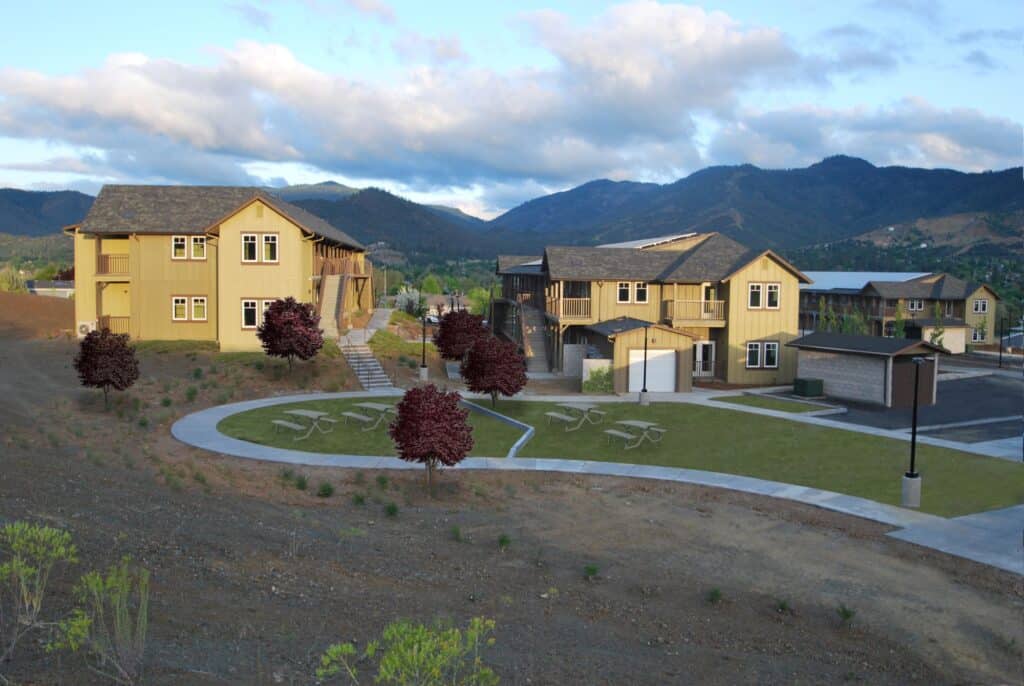“No Place Like Home” Targets Rural CA Residents

By Mark Fogarty
5 min read
California has many programs to boost affordable housing. One example is the No Place Like Home (NPLH) program, which helped fund Siskiyou Crossroads’ rural housing project in Yreka, CA.
NPLH—funds the development of Permanent Supportive Housing (PSH) for those in need of mental health services and are experiencing homelessness, chronic homelessness, or at risk of chronic homelessness—allocated more than $8 million in funding for the Siskiyou Crossroads project, which was developed by the nonprofit Rural Communities Housing Development Corporation (RCHDC) in collaboration with Siskiyou County and the city of Yreka in Northern California.
According to Beth Matsumoto, director of multifamily development at RCHDC, the project was awarded $3.87 million in NPLH competitive funding and $500,000 in non-competitive NPLH funding. In addition, it received an extremely low-interest capitalization operating subsidy of $4.3 million.
The NPLH funding is part of a broader effort in California to redistribute wealth to help stabilize the state’s most vulnerable residents, says Matsumoto. “NPLH repackages the Mental Health Services Act funding, which imposes a tax on millionaires, and expands the behavioral health system for folks who have mental illness.”
Matsumoto says these NPLH subsidies have helped unlock multiple projects targeting vulnerable communities. “We had done a couple of packages with the Mental Health Services Act. NPLH offered capital funds and a capitalized operating subsidy, which is so important for these projects since our targets were extremely low-income folks. We have several of these projects now.”
Siskiyou Crossroads also received $14 million in funding from the Low Income Housing Tax Credit (LIHTC), with syndicator Merritt Community Capital Corporation (Merritt) supplying the LIHTC equity. Chase provided construction financing, and the county kicked in additional soft subsidies.

According to Matsumoto, the development cost for the project, which consists of four two-floor garden-style buildings, was $26.5 million.
“The project is part of a regional strategy for assisting unhoused residents with special needs throughout rural northern California,” according to Merritt. “Wrap-around on-site supportive services will be provided by the Siskiyou County Department of Health and Human Services and RCHDC.”
Twenty-four of the project’s 50 units have gone to the formerly homeless, while another 25 are affordable to Yreka (pronounced Y-Reka) residents from the local workforce and/or seniors. There is one manager’s unit.
The design includes a community room, outdoor and indoor “engagement spaces” for service providers, and private meeting rooms. Green space features include a zero-net-energy solar system that covers the residents’ electricity needs.
The county originally owned the property and planned to develop it into a jail. “The jail didn’t work out,” says Matsumoto; RCHDC acquired the land from the county.
According to Matsumoto, Siskiyou Crossroads is the first PSH project in Siskiyou County, a rural area in the extreme north of California near Mt. Shasta.
Assessment: Need Is Great
Siskiyou Crossroads represents housing that is deeply needed for the relatively rent-burdened community. According to a study from Planwest Partners, nearly 40 percent of Yreka households—and 64 percent of low-income households—pay more than 30 percent of their income toward housing. Though the analysis shows that a $110,000 annual income is needed to afford a median-priced home there, it also shows that 31 percent of all households in the county earn less than $35,000.

The Yreka economy includes a casino, as well as agriculture, mining, manufacturing, retail, and government jobs. Matsumoto says that residents at Siskiyou Crossroads average 42 percent of area median income.
Matsumoto says that Siskiyou Crossroads comes as a result of sustained effort by the county to assemble funds for low-income housing. “It took a lot of local support and groundwork,” she says.
The city of Yreka says, “The project leverages millions of dollars in non-County funds to develop needed housing for our community. The State of California is providing local governments and affordable housing developers with unprecedented funding to address housing needs and homelessness in their communities.”
After a Request for Qualifications process, Siskiyou County selected RCHDC as the County’s Development Sponsor for its NPLH housing project in July 2020.
“RCHDC presented to the Board of Supervisors on Oct. 6, 2020 to describe their background, experience, and share early plans for the NPLH project. On Dec. 8, 2020, the Board approved an exclusive negotiating rights agreement with RCHDC to purchase county-owned property located on Foothill Drive in Yreka for the NPLH project,” according to the city.
RCHDC was started in 1974 by a community housing development corporation that saw a real need for affordable senior housing. In the past five years, though, it has specialized in special needs housing.
The project is now finished and achieved full occupancy in April 2024, with a mix of local workforce and tenants on disability. “The majority of [the tenants] are very happy with the housing,” Matsumoto says.
No Place Like Home Program
This program funds the development of permanent supportive housing for people in need of mental health services and experiencing homelessness, chronic homelessness, or at risk of chronic homelessness, according to the California Department of Housing and Community Development.
In November 2018, voters approved Proposition 2, authorizing the sale of up to $2 billion of revenue bonds and the use of a portion of Proposition 63 taxes for the NPLH program. The bonds are repaid by funding from the Mental Health Services Act (MHSA). The program has both competitive and non-competitive features.
Key features of the program include:
- Counties will be eligible applicants (either solely or with a housing development sponsor);
- Funding for permanent supportive housing must utilize low-barrier tenant selection practices that prioritize vulnerable populations and offer flexible, voluntary, and individualized supportive services; and
- Counties must commit to providing mental health services and help coordinate access to other community-based supportive services.
Source: California Department of Housing and Community Development